Potential of Time-Series Sentinel 2 Data for Monitoring Avocado Crop Phenology
Abstract
1. Introduction
- (1)
- to investigate the potential of S2 EVI time-series data for deriving the seasonal growth profiles of ‘Hass’ avocado crops and for identifying the extent of seasonal variations within the study period (2017–2021);
- (2)
- to associate the seasonal growth profiles with four key phenological stages (i.e., F, V, M, and H) in order to determine the timing of avocado phenophases;
- (3)
- by undertaking research on orchards grown in Bundaberg, Queensland and Renmark, South Australia, to compare the influence of the growing location on the EVI time-series profiles and key phenological stages.
2. Materials and Methods
2.1. Study Area
2.2. Avocado Phenological Data
2.3. Sentinel 2 Data
2.4. Enhanced Vegetation Index
2.5. Savitzky–Golay Smoothing
2.6. EVI Metrices
2.7. Statistical Analysis
3. Results
3.1. SG-Smoothed Time-Series EVI at Key Phenological Stages
3.2. Differentiating Phenological Stages Using EVI Metrics
3.3. Seasonal Variability of the EVI
3.4. Variability in the EVI between the Two Farms
4. Discussion
5. Conclusions
Author Contributions
Funding
Acknowledgments
Conflicts of Interest
References
- Avocado Austrlia. Facts at a Glance for the Australian Avocado Industry—2020/21. 2021. Available online: https://avocado.org.au/wp-content/uploads/2021/10/2020-21_AAL-Facts-at-a-glance3.pdf (accessed on 30 July 2022).
- Whiley, A.W. Avocado Production in Australia. In Avocado Production in Asia and the Pacific; Papademtriou, M.K., Ed.; Food and Agriculture Organization of the United Nations, Regional Office for Asia and the Pacific: Bangkok, Thailand, 2000; Available online: https://www.fao.org/publications/card/en/c/e001af72-db59-5a89-ad40-aee479743100/ (accessed on 30 July 2022).
- Thorp, T.G.; Aspinall, D.; Sedgley, M. Preformation of Node Number in Vegetative and Reproductive Proleptic Shoot Modules of Persea (Lauraceae). Ann. Bot. 1994, 73, 13–22. [Google Scholar] [CrossRef]
- Whiley, A.W.; Wolstenholme, B.N. Carbohydrate management in avocado trees for increased production. SAAGA Yearb. 1990, 13, 25–27. [Google Scholar]
- Wolstenholme, B.N.; Whiley, A.W. Carbohydrate and phenological cycling as management tools for avocado orchards. SAAGA Yearb. 1989, 12, 33–37. [Google Scholar]
- Garner, L.C.; Lovatt, C.J. The Relationship Between Flower and Fruit Abscission and Alternate Bearing of ‘Hass’ Avocado. J. Am. Soc. Hortic. Sci. 2008, 133, 3–10. [Google Scholar] [CrossRef]
- Whiley, A.W.; Saranah, J.B.; Wolstenholme, B.N. Pheno-physiological modelling in avocado-an aid in research planning. In Proceedings of the World Avocado Congress III, Tel Aviv, Israel, 22–27 October 1995; pp. 71–75. [Google Scholar]
- Alcaraz, M.; Thorp, T.G.; Hormaza, J. Phenological growth stages of avocado (Persea americana) according to the BBCH scale. Sci. Hortic. 2013, 164, 434–439. [Google Scholar] [CrossRef]
- Márquez-Santos, M.; Hernández-Lauzardo, A.N.; Castrejón-Gómez, V.R. States of phenological development of avocado (Persea americana Mill.) based on the BBCH scale extended and its relationship to the incidence of anthracnose in field conditions. Sci. Hortic. 2020, 271, 109379. [Google Scholar] [CrossRef]
- Torgbor, B.A.; Rahman, M.M.; Robson, A.; Brinkhoff, J.; Khan, A. Assessing the Potential of Sentinel-2 Derived Vegetation Indices to Retrieve Phenological Stages of Mango in Ghana. Horticulturae 2022, 8, 11. [Google Scholar] [CrossRef]
- Salazar-García, S.; Lord, E.M.; Lovatt, C.J. Inflorescence and flower development of the ‘Hass’ avocado (Persea americana Mill.) during “on” and “off” crop years. J. Am. Soc. Hortic. Sci. 1998, 123, 537–544. [Google Scholar] [CrossRef]
- Chanderbali, A.S.; Soltis, D.E.; Soltis, P.S.; Wolstenholme, B.N. Taxonomy and botany. In The Avocado, Botany, Production and Uses; Schaffer, B., Wolstenholme, B.N., Whiley, A.W., Eds.; CAB International: Wallingford, UK, 2013; pp. 31–49. [Google Scholar]
- Thorp, T.G.; Sedgley, M. Architectural analysis of tree form in a range of avocado cultivars. Sci. Hortic. 1993, 53, 85–98. [Google Scholar] [CrossRef]
- Newett, S.; Dixon, J. Avocado Tree Growth Cycle. Available online: http://www.avocadosource.com/journals/ausnz/ausnz_2009/newettsimon2009.pdf (accessed on 30 September 2021).
- Bergh, B. Factors affecting avocado fruitfulness. In Proceedings of the First International Tropical Fruit Short Course: The Avocado; University of Florida: Gainesville, FL, USA, 1977; pp. 83–88. [Google Scholar]
- Wolstenholme, B.; Whiley, A. Strategies for maximising avocado productivity: An overview. In Proceedings of the World Avocado Congress III, Tel Aviv, Israel, 22–27 October 1995; p. 70. [Google Scholar]
- Dixon, J.; Elmsly, T.; Dixon, E.; Mandemaker, A.; Pak, H. Factors Influencing Fruit Set of Hass Avocados in New Zealand. In Proceedings of the World Avocado Congress VI, Viña del Mar, Chile, 12–16 November 2007; ISBN 978-956-17-0413-8. [Google Scholar]
- Lahav, E.; Zamet, D. Flowers, fruitlets and fruit drop in avocado trees. Rev. Chapingo Ser. Hortic. 1999, 5, 95–100. [Google Scholar]
- Garner, L.C.; Lovatt, C.J. Physiological factors affecting flower and fruit abscission of ‘Hass’ avocado. Sci. Hortic. 2016, 199, 32–40. [Google Scholar] [CrossRef]
- Kaiser, C.; Wolstenholme, B.N. Aspects of delayed harvest of ‘Hass’ avocado (Persea americana Mill.) fruit in a cool subtropical climate. I. Fruit lipid and fatty acid accumulation. J. Hortic. Sci. 1994, 69, 437–445. [Google Scholar] [CrossRef]
- Pinto, J.; Rueda-Chacón, H.; Arguello, H. Classification of Hass avocado (Persea americana mill) in terms of its ripening via hyperspectral images. TecnoLógicas 2019, 22, 111–130. [Google Scholar] [CrossRef]
- Toivonen, P.M.A.; Brummell, D.A. Biochemical bases of appearance and texture changes in fresh-cut fruit and vegetables. Postharvest Biol. Technol. 2008, 48, 1–14. [Google Scholar] [CrossRef]
- Piao, S.; Liu, Q.; Chen, A.; Janssens, I.A.; Fu, Y.; Dai, J.; Liu, L.; Lian, X.; Shen, M.; Zhu, X. Plant phenology and global climate change: Current progresses and challenges. Glob. Chang. Biol. 2019, 25, 1922–1940. [Google Scholar] [CrossRef] [PubMed]
- Usha, K.; Singh, B. Potential applications of remote sensing in horticulture—A review. Sci. Hortic. 2013, 153, 71–83. [Google Scholar] [CrossRef]
- Boschetti, M.; Stroppiana, D.; Brivio, P.A.; Bocchi, S. Multi-year monitoring of rice crop phenology through time series analysis of MODIS images. Int. J. Remote Sens. 2009, 30, 4643–4662. [Google Scholar] [CrossRef]
- Yang, W.; Zhang, S. Monitoring Vegetation Phenology Using MODIS Time-Series Data. In Proceedings of the 2012 2nd International Conference on Remote Sensing, Environment and Transportation Engineering, (RSETE), Nanjing, China, 1–3 June 2012; pp. 1–4. [Google Scholar]
- Pan, Z.; Huang, J.; Zhou, Q.; Wang, L.; Cheng, Y.; Zhang, H.; Blackburn, G.A.; Yan, J.; Liu, J. Mapping crop phenology using NDVI time-series derived from HJ-1 A/B data. Int. J. Appl. Earth Obs. Geoinf. 2015, 34, 188–197. [Google Scholar] [CrossRef]
- Zheng, Y.; Wu, B.; Zhang, M.; Zeng, H. Crop Phenology Detection Using High Spatio-Temporal Resolution Data Fused from SPOT5 and MODIS Products. Sensors 2016, 16, 2099. [Google Scholar] [CrossRef]
- Sehgal, V.K.; Jain, S.; Aggarwal, P.K.; Jha, S. Deriving Crop Phenology Metrics and Their Trends Using Times Series NOAA-AVHRR NDVI Data. J. Indian Soc. Remote Sens. 2011, 39, 373–381. [Google Scholar] [CrossRef]
- Shihua, L.; Jingtao, X.; Ping, N.; Jing, Z.; Hongshu, W.; Jingxian, W. Monitoring paddy rice phenology using time series MODIS data over Jiangxi Province, China. Int. J. Agric. Biol. Eng. 2014, 7, 28–36. [Google Scholar]
- Sun, L.; Gao, F.; Anderson, M.C.; Kustas, W.P.; Alsina, M.M.; Sanchez, L.; Sams, B.; McKee, L.; Dulaney, W.; White, W.A.; et al. Daily Mapping of 30 m LAI and NDVI for Grape Yield Prediction in California Vineyards. Remote Sens. 2017, 9, 317. [Google Scholar] [CrossRef]
- Sakamoto, T.; Yokozawa, M.; Toritani, H.; Shibayama, M.; Ishitsuka, N.; Ohno, H. A crop phenology detection method using time-series MODIS data. Remote Sens. Environ. 2005, 96, 366–374. [Google Scholar] [CrossRef]
- Brown, M.; De Beurs, K.; Marshall, M. Global phenological response to climate change in crop areas using satellite remote sensing of vegetation, humidity and temperature over 26 years. Remote Sens. Environ. 2012, 126, 174–183. [Google Scholar] [CrossRef]
- Heumann, B.W.; Seaquist, J.; Eklundh, L.; Jönsson, P. AVHRR derived phenological change in the Sahel and Soudan, Africa, 1982–2005. Remote Sens. Environ. 2007, 108, 385–392. [Google Scholar] [CrossRef]
- Pan, L.; Xia, H.; Zhao, X.; Guo, Y.; Qin, Y. Mapping Winter Crops Using a Phenology Algorithm, Time-Series Sentinel-2 and Landsat-7/8 Images, and Google Earth Engine. Remote Sens. 2021, 13, 2510. [Google Scholar] [CrossRef]
- Rahman, M.M.; Robson, A. Integrating Landsat-8 and Sentinel-2 Time Series Data for Yield Prediction of Sugarcane Crops at the Block Level. Remote Sens. 2020, 12, 1313. [Google Scholar] [CrossRef]
- Griffiths, P.; Nendel, C.; Hostert, P. Intra-annual reflectance composites from Sentinel-2 and Landsat for national-scale crop and land cover mapping. Remote Sens. Environ. 2019, 220, 135–151. [Google Scholar] [CrossRef]
- Rodrigues, A.; Marçal, A.R.; Cunha, M. Monitoring vegetation dynamics inferred by satellite data using the PhenoSat tool. IEEE Trans. Geosci. Remote Sens. 2012, 51, 2096–2104. [Google Scholar] [CrossRef]
- Duarte, L.; Teodoro, A.C.; Monteiro, A.T.; Cunha, M.; Gonçalves, H. QPhenoMetrics: An open source software application to assess vegetation phenology metrics. Comput. Electron. Agric. 2018, 148, 82–94. [Google Scholar] [CrossRef]
- Eklundh, L.; Jönsson, P. TIMESAT for Processing Time-Series Data from Satellite Sensors for Land Surface Monitoring. In Multitemporal Remote Sensing; Remote Sensing and Digital Image Processing; Ban, Y., Ed.; Springer: Cham, Switzerland, 2016; Volume 20. [Google Scholar] [CrossRef]
- Eerens, H.; Haesen, D.; Rembold, F.; Urbano, F.; Tote, C.; Bydekerke, L. Image time series processing for agriculture monitoring. Environ. Model. Softw. 2014, 53, 154–162. [Google Scholar] [CrossRef]
- Sawant, S.; Chakraborty, M.; Suradhaniwar, S.; Adinarayana, J.; Durbha, S. Time series analysis of remote sensing observtions for citrus crop growth stage and evapotranspiration estimation. In Proceedings of the International Archives of the Photogrammetry, Remote Sensing and Spatial Information Sciences, XXIII ISPRS Congress, Prague, Czech Republic, 12–19 July 2016; Volume XLI-B8. [Google Scholar] [CrossRef]
- Choudhary, K.; Shi, W.; Boori, M.S.; Corgne, S. Agriculture phenology monitoring using NDVI time series based on remote sensing satellites: A case study of Guangdong, China. Opt. Mem. Neural Netw. 2019, 28, 204–214. [Google Scholar] [CrossRef]
- Hatfield, J.L.; Gitelson, A.A.; Schepers, J.S.; Walthall, C.L. Application of spectral remote sensing for agronomic decisions. Agron. J. 2008, 100, S117–S131. [Google Scholar] [CrossRef]
- Fraga, H.; Amraoui, M.; Malheiro, A.C.; Moutinho-Pereira, J.; Eiras-Dias, J.; Silvestre, J.; Santos, J.A. Examining the relationship between the Enhanced Vegetation Index and grapevine phenology. Eur. J. Remote Sens. 2014, 47, 753–771. [Google Scholar] [CrossRef]
- Bai, T.; Zhang, N.; Mercatoris, B.; Chen, Y. Jujube yield prediction method combining Landsat 8 Vegetation Index and the phenological length. Comput. Electron. Agric. 2019, 162, 1011–1027. [Google Scholar] [CrossRef]
- Huete, A.; Didan, K.; Miura, T.; Rodriguez, E.P.; Gao, X.; Ferreira, L.G. Overview of the radiometric and biophysical performance of the MODIS vegetation indices. Remote Sens. Environ. 2002, 83, 195–213. [Google Scholar] [CrossRef]
- Galford, G.L.; Mustard, J.F.; Melillo, J.; Gendrin, A.; Cerri, C.C.; Cerri, C.E. Wavelet analysis of MODIS time series to detect expansion and intensification of row-crop agriculture in Brazil. Remote Sens. Environ. 2008, 112, 576–587. [Google Scholar] [CrossRef]
- Chen, J.; Jönsson, P.; Tamura, M.; Gu, Z.; Matsushita, B.; Eklundh, L. A simple method for reconstructing a high-quality NDVI time-series data set based on the Savitzky–Golay filter. Remote Sens. Environ. 2004, 91, 332–344. [Google Scholar] [CrossRef]
- Cao, R.; Chen, Y.; Shen, M.; Chen, J.; Zhou, J.; Wang, C.; Yang, W. A simple method to improve the quality of NDVI time-series data by integrating spatiotemporal information with the Savitzky-Golay filter. Remote Sens. Environ. 2018, 217, 244–257. [Google Scholar] [CrossRef]
- Chen, Y.; Cao, R.; Chen, J.; Liu, L.; Matsushita, B. A practical approach to reconstruct high-quality Landsat NDVI time-series data by gap filling and the Savitzky–Golay filter. ISPRS J. Photogramm. Remote Sens. 2021, 180, 174–190. [Google Scholar] [CrossRef]
- Meng, J.; Wu, B.; Li, Q.; Du, X.; Jia, K. Monitoring crop phenology with MERIS data—A case study of winter wheat in North China Plain. In Proceedings of the Progress in Electromagnetics Research Symposium, Beijing, China, 23–27 March 2009; pp. 1225–1228. [Google Scholar]
- BOM. Bureau of Meteorology. Available online: http://www.bom.gov.au (accessed on 15 September 2021).
- Gorelick, N.; Hancher, M.; Dixon, M.; Ilyushchenko, S.; Thau, D.; Moore, R. Google Earth Engine: Planetary-scale geospatial analysis for everyone. Remote Sens. Environ. 2017, 202, 18–27. [Google Scholar] [CrossRef]
- Pan, L.; Xia, H.; Yang, J.; Niu, W.; Wang, R.; Song, H.; Guo, Y.; Qin, Y. Mapping cropping intensity in Huaihe basin using phenology algorithm, all Sentinel-2 and Landsat images in Google Earth Engine. Int. J. Appl. Earth Obs. Geoinf. 2021, 102, 102376. [Google Scholar] [CrossRef]
- Louis, J.; Debaecker, V.; Pflug, B.; Main-Knorn, M.; Bieniarz, J.; Mueller-Wilm, U.; Cadau, E.; Gascon, F. Sentinel-2 Sen2Cor: L2A processor for users. In Proceedings of the Living Planet Symposium 2016, Prague, Czech Republic, 9–13 May 2016; pp. 1–8. [Google Scholar]
- Zhu, Z.; Woodcock, C.E. Automated cloud, cloud shadow, and snow detection in multitemporal Landsat data: An algorithm designed specifically for monitoring land cover change. Remote Sens. Environ. 2014, 152, 217–234. [Google Scholar] [CrossRef]
- Li, H.; Jia, M.; Zhang, R.; Ren, Y.; Wen, X. Incorporating the Plant Phenological Trajectory into Mangrove Species Mapping with Dense Time Series Sentinel-2 Imagery and the Google Earth Engine Platform. Remote Sens. 2019, 11, 2479. [Google Scholar] [CrossRef]
- Huete, A.R.; Liu, H.Q.; Batchily, K.; van Leeuwen, W. A comparison of vegetation indices over a global set of TM images for EOS-MODIS. Remote Sens. Environ. 1997, 59, 440–451. [Google Scholar] [CrossRef]
- Miura, T.; Huete, A.R.; Yoshioka, H.; Holben, B.N. An error and sensitivity analysis of atmospheric resistant vegetation indices derived from dark target-based atmospheric correction. Remote Sens. Environ. 2001, 78, 284–298. [Google Scholar] [CrossRef]
- Savitzky, A.; Golay, M.J. Smoothing and differentiation of data by simplified least squares procedures. Anal. Chem. 1964, 36, 1627–1639. [Google Scholar] [CrossRef]
- Beurs, K.M.d.; Henebry, G.M. Spatio-temporal statistical methods for modelling land surface phenology. In Phenological Research; Hudson, I., Keatley, M., Eds.; Springer: Dordrecht, The Netherlands, 2010; pp. 177–208. [Google Scholar] [CrossRef]
- Bressert, E. SciPy and NumPy: An overview for Developers; O’Reilly Media, Inc.: Sebastopol, CA, USA, 2012. [Google Scholar]
- Van Rossum, G.; Drake, F.L. Python 3 Reference Manual; CreateSpace: Scotts Valley, CA, USA, 2009. [Google Scholar]
- Liu, X.; Hofshi, R.; Arpaia, M.L. Hass’ avocado leaf growth, abscission, carbon production and fruit set. In Proceedings of the Avocado Brainstorming, Riverside, CA, USA, 27–28 October 1999; Arpaia, M.L., Hofshi, R., Eds.; Hofshi Foundation: Fallbrook, CA, USA, 1999; pp. 52–55. [Google Scholar]
- Basso, B.; Cammarano, D.; Carfagna, E. Review of crop yield forecasting methods and early warning systems. In Proceedings of the First Meeting of the Scientific Advisory Committee of the Global Strategy to Improve Agricultural and Rural Statistics, Rome, Italy, 9–10 April 2013; p. 19. [Google Scholar]
- Shen, M.; Chen, J.; Zhu, X.; Tang, Y. Yellow flowers can decrease NDVI and EVI values: Evidence from a field experiment in an alpine meadow. Can. J. Remote Sens. 2009, 35, 99–106. [Google Scholar] [CrossRef]
- Inoue, H.; Takahashi, B. Studies on the Bearing Behavior and Yield Composition of the Avocado Tree. J. Jpn. Soc. Hortic. Sci. 1990, 59, 487–501. [Google Scholar] [CrossRef]
- Davenport, T. Avocado growth and development. Proc. Fla. State Hortic. Soc. 1982, 95, 92–96. [Google Scholar]
- Mickelbart, M.V.; Robinson, P.W.; Witney, G.; Arpaia, M.L. ‘Hass’ avocado tree growth on four rootstocks in California. II. Shoot and root growth. Sci. Hortic. 2012, 143, 205–210. [Google Scholar] [CrossRef]
- Whiley, A.W.; Saranah, J.B.; Rasmussen, T.S. The Relationship between Carbohydrate Levels and Productivity in the Avocado and Impact on Management Practices, Particularly Time of Harvest; Talking Avocados, Report—AV033; Queensland Department of Primary Industries: Brisbane, Australia, 1996. [Google Scholar]
- Wolstenholme, B. Theoretical and applied aspects of avocado yield as affected by energy budgets and carbon partitioning. In South African Avocado Growers’ Association Yearbook, Proceedings of the First World Avocado Congress, Pretoria, South Africa, 4–8 May 1987; South African Avocado Growers’ Association: Tzaneen, South Africa, 1987; Volume 10, pp. 58–61. [Google Scholar]
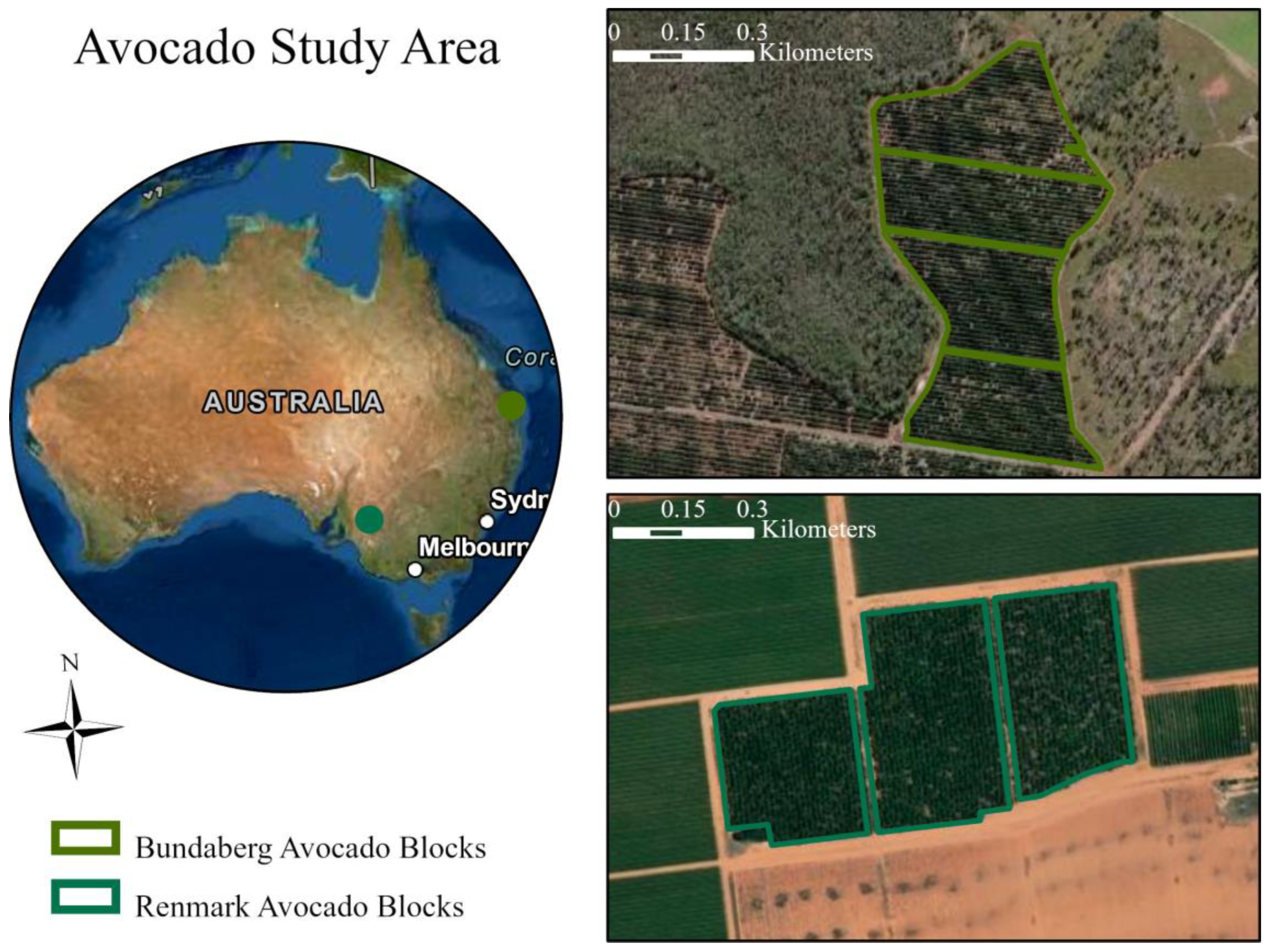
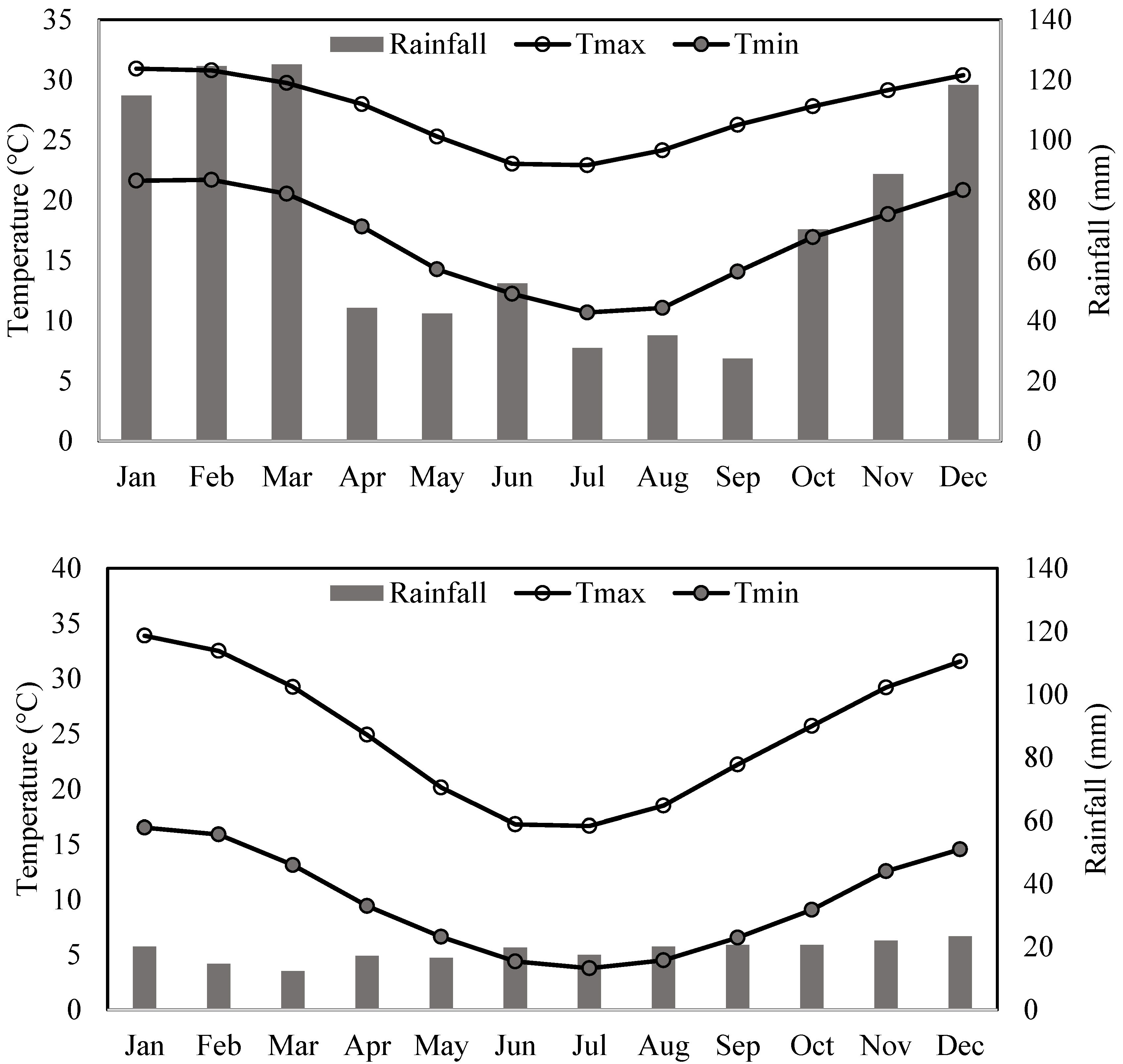
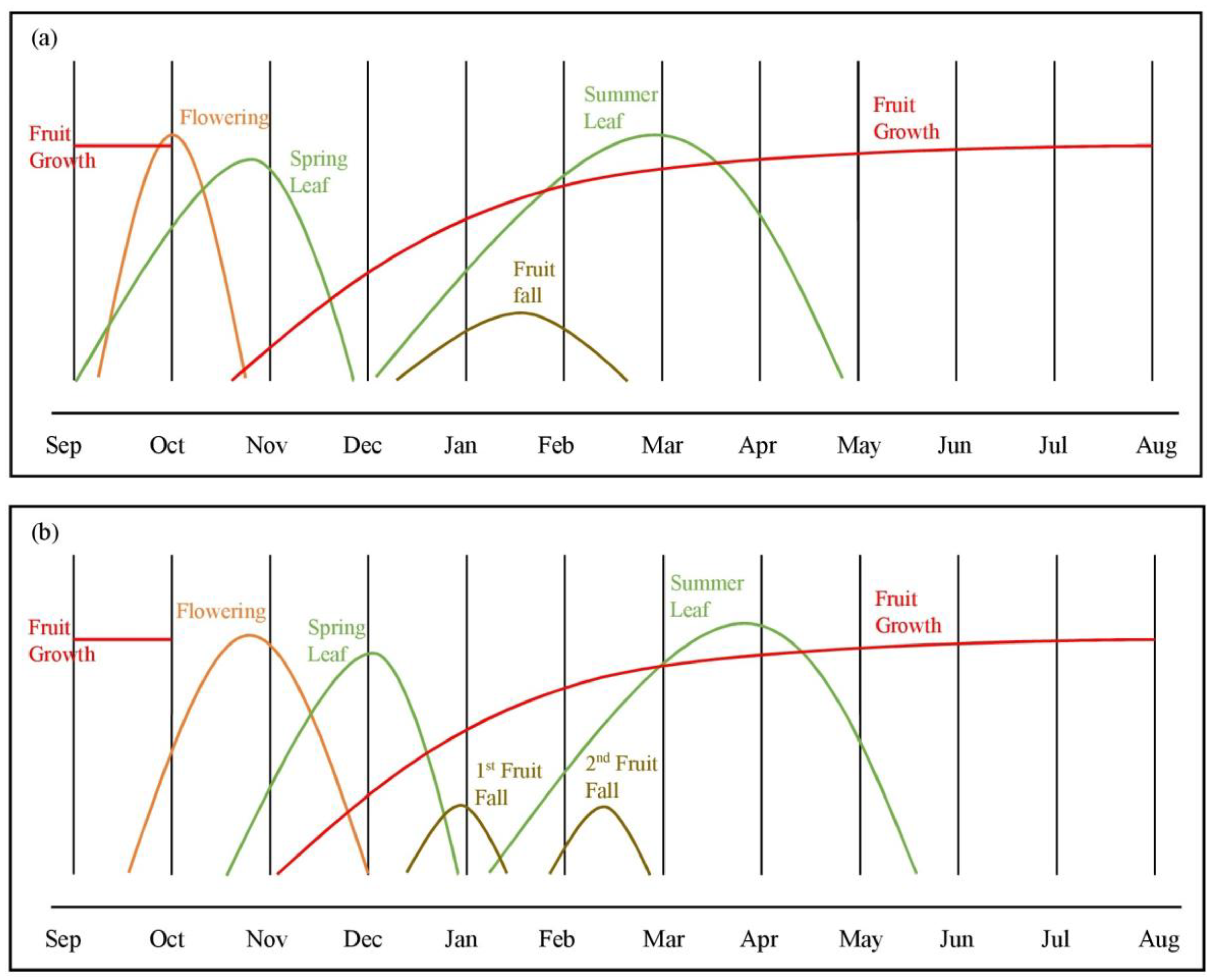
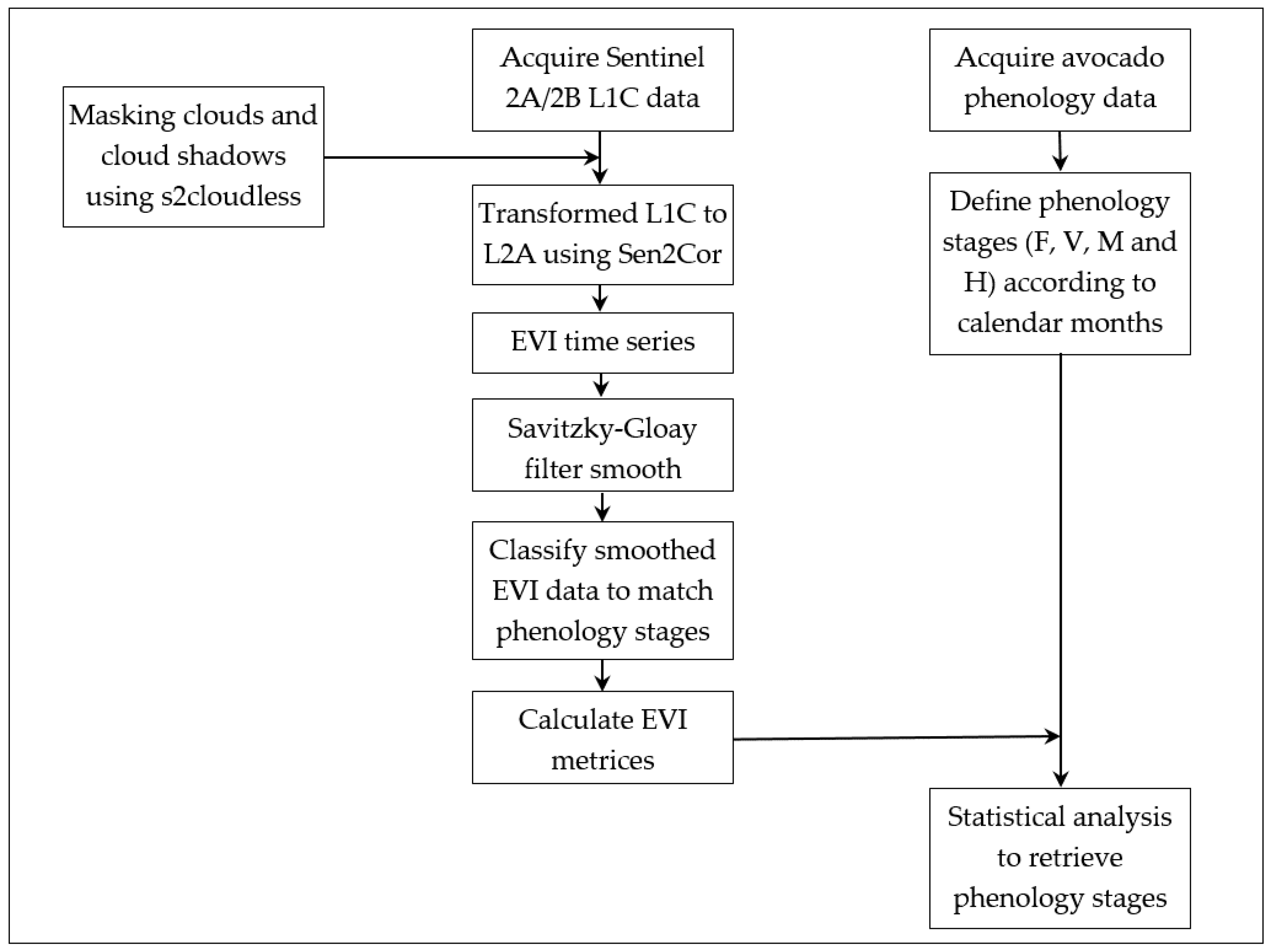

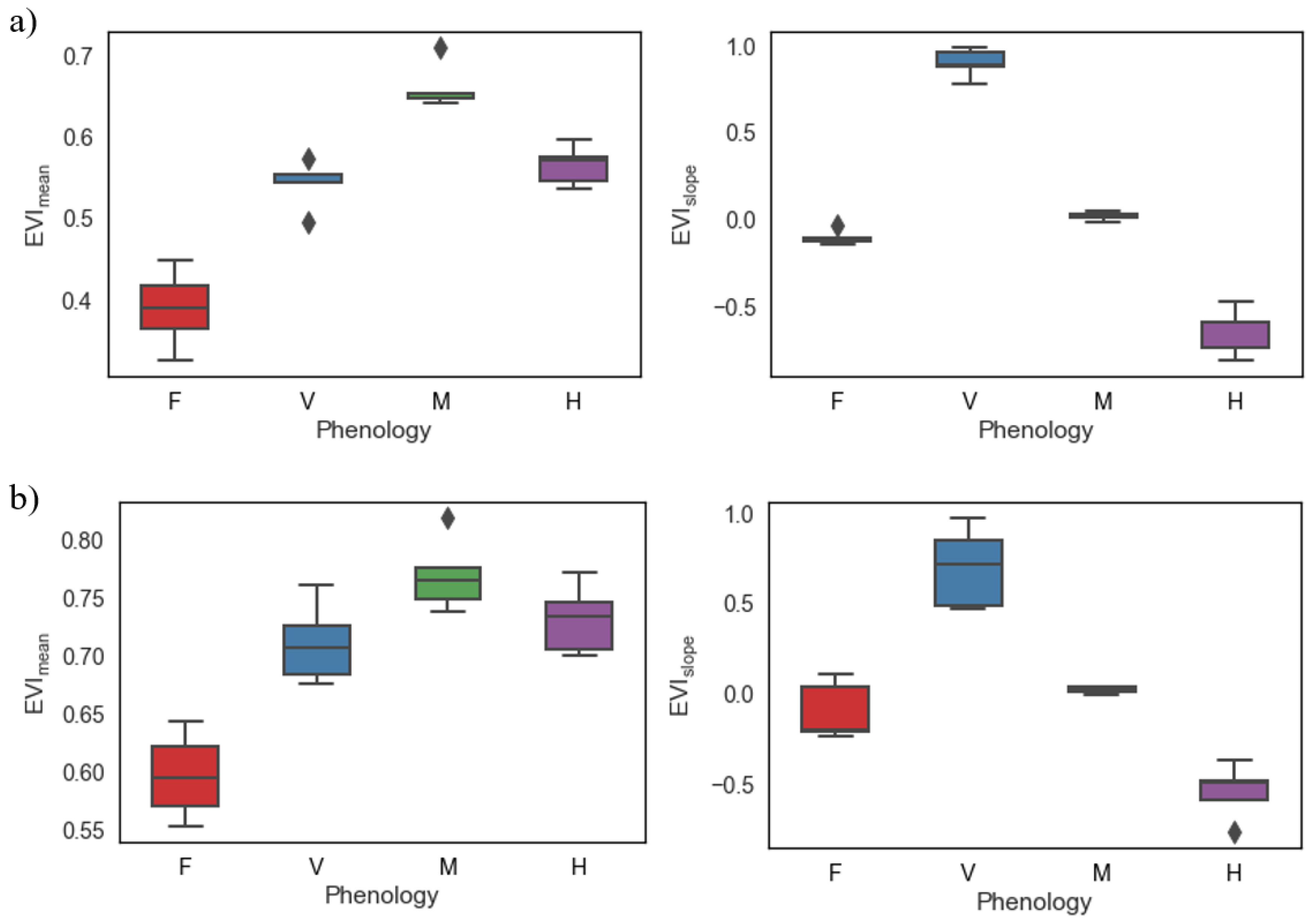
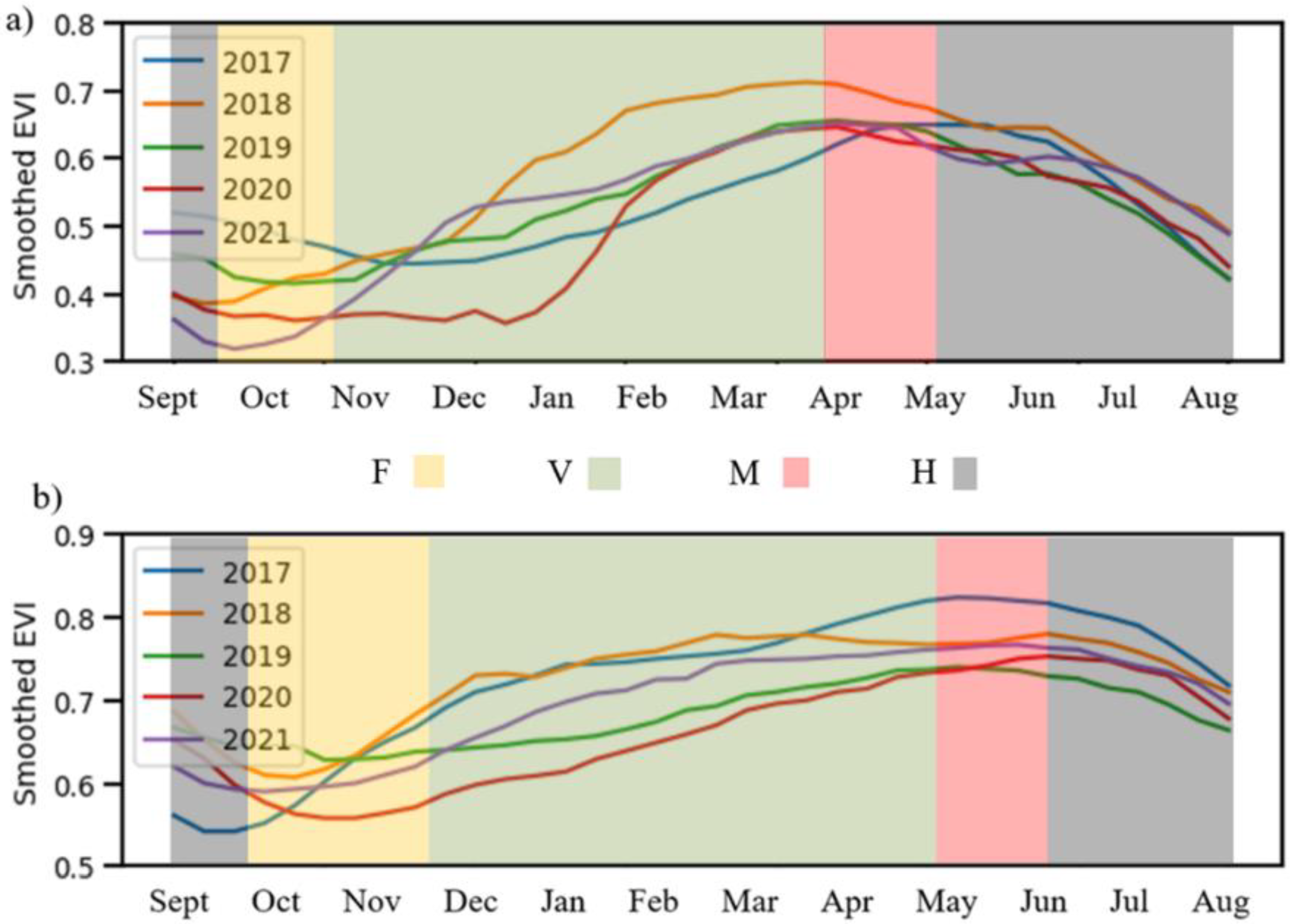

| Phenology Stages | Bundaberg | Renmark |
|---|---|---|
| Flowering (F) | September 2nd week–October 3rd week | September 3rd week–November 3rd week |
| Vegetative flush (V) | October 4th week–April | November 4th week–May |
| Fruit Maturity (M) | April–May | May–June |
| Harvest (H) | May–September 1st week | June–September 2nd week |
| EVImean at Bundaberg Farm | ||||
|---|---|---|---|---|
| Difference between Stages | Mean Difference | Std. Error | t | P > |t| |
| H-F | 0.18 | 0.02 | 8.30 | 3.39 × 10−7 |
| M-F | 0.28 | 0.02 | 12.80 | 8.02 × 10−10 |
| V-F | 0.16 | 0.02 | 7.22 | 2.04 × 10−6 |
| M-H | 0.10 | 0.02 | 4.49 | 3.67 × 10−4 |
| V-H | −0.03 | 0.02 | −1.08 | 2.94 × 10−1 |
| V-M | −0.12 | 0.02 | −5.58 | 4.14 × 10−5 |
| EVIslope at Bundaberg Farm | ||||
| H-F | −0.56 | 0.05 | −10.61 | 1.20 × 10−8 |
| M-F | 0.12 | 0.05 | 2.29 | 3.58 × 10−2 |
| V-F | 1.00 | 0.05 | 18.86 | 2.35 × 10−12 |
| M-H | 0.69 | 0.05 | 12.90 | 7.16 × 10−10 |
| V-H | 1.57 | 0.05 | 29.47 | 2.27 × 10−15 |
| V-M | 0.88 | 0.05 | 16.57 | 1.70 × 10−11 |
| EVImean at Renmark Farm | ||||
| H-F | 0.13 | 0.02 | 6.39 | 8.81 × 10−6 |
| M-F | 0.17 | 0.02 | 8.18 | 4.12 × 10−7 |
| V-F | 0.11 | 0.02 | 5.41 | 5.74 × 10−5 |
| M-H | 0.04 | 0.02 | 1.78 | 9.32 × 10−2 |
| V-H | −0.02 | 0.02 | −0.98 | 3.39 × 10−1 |
| V-M | −0.06 | 0.02 | −2.77 | 1.36 × 10−2 |
| EVIslope at Renmark Farm | ||||
| H-F | −0.44 | 0.09 | −4.48 | 3.79 × 10−4 |
| M-F | 0.12 | 0.09 | 1.21 | 2.45 × 10−1 |
| V-F | 0.79 | 0.09 | 8.11 | 4.66 × 10−7 |
| M-H | 0.56 | 0.09 | 5.68 | 3.38 × 10−5 |
| V-H | 1.24 | 0.09 | 12.59 | 1.03 × 10−9 |
| V-M | 0.68 | 0.09 | 6.90 | 3.57 × 10−6 |
| Bundaberg Farm | ||||
|---|---|---|---|---|
| Difference between Stages | Mean Difference | Std. Error | t | P > |t| |
| 2017–2018 | −0.043506 | 0.023061 | −1.886572 | 0.366870 |
| 2017–2019 | 0.000944 | 0.023061 | 0.040955 | 0.998689 |
| 2017–2020 | 0.035722 | 0.023061 | 1.549056 | 0.545558 |
| 2017–2021 | 0.003178 | 0.023061 | 0.137801 | 0.998689 |
| 2018–2019 | −0.044450 | 0.023061 | −1.927527 | 0.366870 |
| 2018–2020 | −0.079228 | 0.023061 | −3.435628 | 0.007359 * |
| 2018–2021 | −0.046683 | 0.023061 | −2.024373 | 0.335841 |
| 2019–2020 | −0.034778 | 0.023061 | −1.508101 | 0.545558 |
| 2019–2021 | −0.002233 | 0.023061 | −0.096846 | 0.998689 |
| 2020–2021 | 0.032544 | 0.023061 | 1.411255 | 0.545558 |
| Renmark Farm | ||||
| 2017–2018 | −0.002528 | 0.015251 | −0.165742 | 0.868552 |
| 2017–2019 | 0.042694 | 0.015251 | 2.799396 | 0.039189 * |
| 2017–2020 | 0.063444 | 0.015251 | 4.159935 | 0.000448 * |
| 2017–2021 | 0.027539 | 0.015251 | 1.805674 | 0.260559 |
| 2018–2019 | −0.045222 | 0.015251 | −2.965137 | 0.027252 * |
| 2018–2020 | −0.065972 | 0.015251 | −4.325676 | 0.000255 * |
| 2018–2021 | −0.030067 | 0.015251 | −1.971416 | 0.227248 |
| 2019–2020 | −0.020750 | 0.015251 | −1.360539 | 0.439319 |
| 2019–2021 | 0.015156 | 0.015251 | 0.993722 | 0.539950 |
| 2020–2021 | 0.035906 | 0.015251 | 2.354261 | 0.112360 |
| EVImean at Bundaberg Farm | ||||
|---|---|---|---|---|
| Difference between Farms | Mean Difference | Std. Error | t | P > |t| |
| Renmark–Bundaberg | 0.16 | 0.01 | 18.00 | 4.09 × 10−53 |
Publisher’s Note: MDPI stays neutral with regard to jurisdictional claims in published maps and institutional affiliations. |
© 2022 by the authors. Licensee MDPI, Basel, Switzerland. This article is an open access article distributed under the terms and conditions of the Creative Commons Attribution (CC BY) license (https://creativecommons.org/licenses/by/4.0/).
Share and Cite
Rahman, M.M.; Robson, A.; Brinkhoff, J. Potential of Time-Series Sentinel 2 Data for Monitoring Avocado Crop Phenology. Remote Sens. 2022, 14, 5942. https://doi.org/10.3390/rs14235942
Rahman MM, Robson A, Brinkhoff J. Potential of Time-Series Sentinel 2 Data for Monitoring Avocado Crop Phenology. Remote Sensing. 2022; 14(23):5942. https://doi.org/10.3390/rs14235942
Chicago/Turabian StyleRahman, Muhammad Moshiur, Andrew Robson, and James Brinkhoff. 2022. "Potential of Time-Series Sentinel 2 Data for Monitoring Avocado Crop Phenology" Remote Sensing 14, no. 23: 5942. https://doi.org/10.3390/rs14235942
APA StyleRahman, M. M., Robson, A., & Brinkhoff, J. (2022). Potential of Time-Series Sentinel 2 Data for Monitoring Avocado Crop Phenology. Remote Sensing, 14(23), 5942. https://doi.org/10.3390/rs14235942








